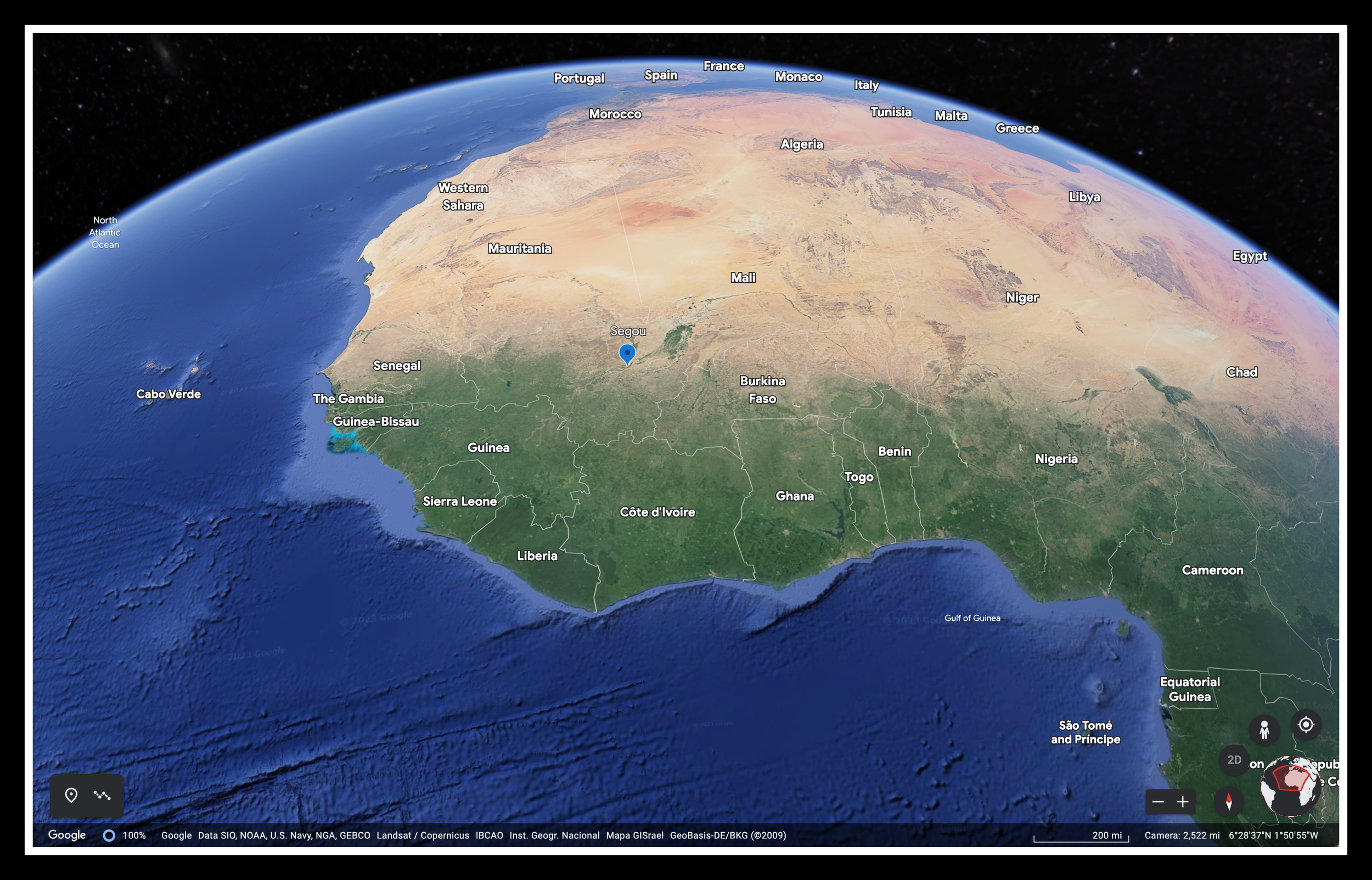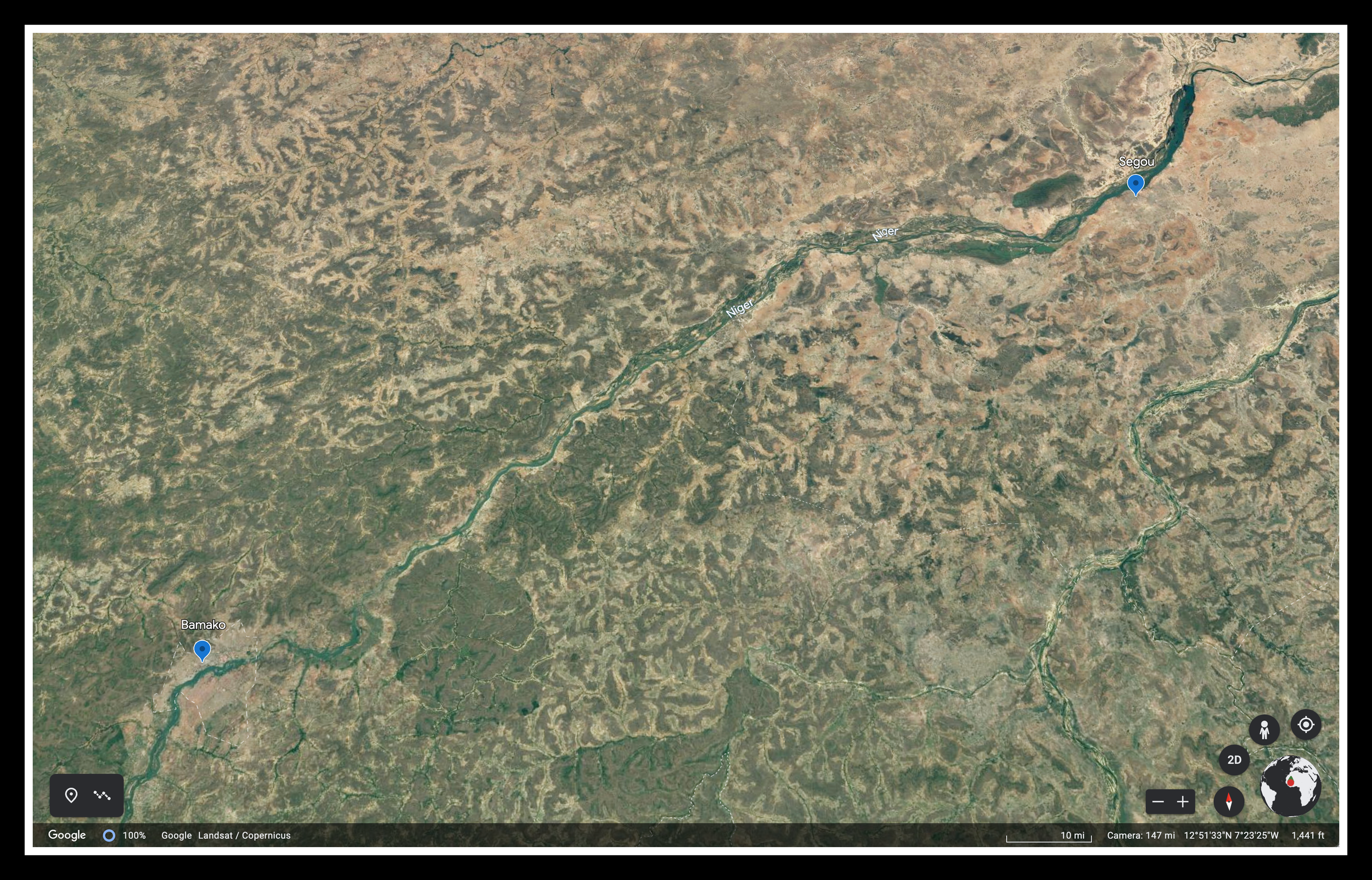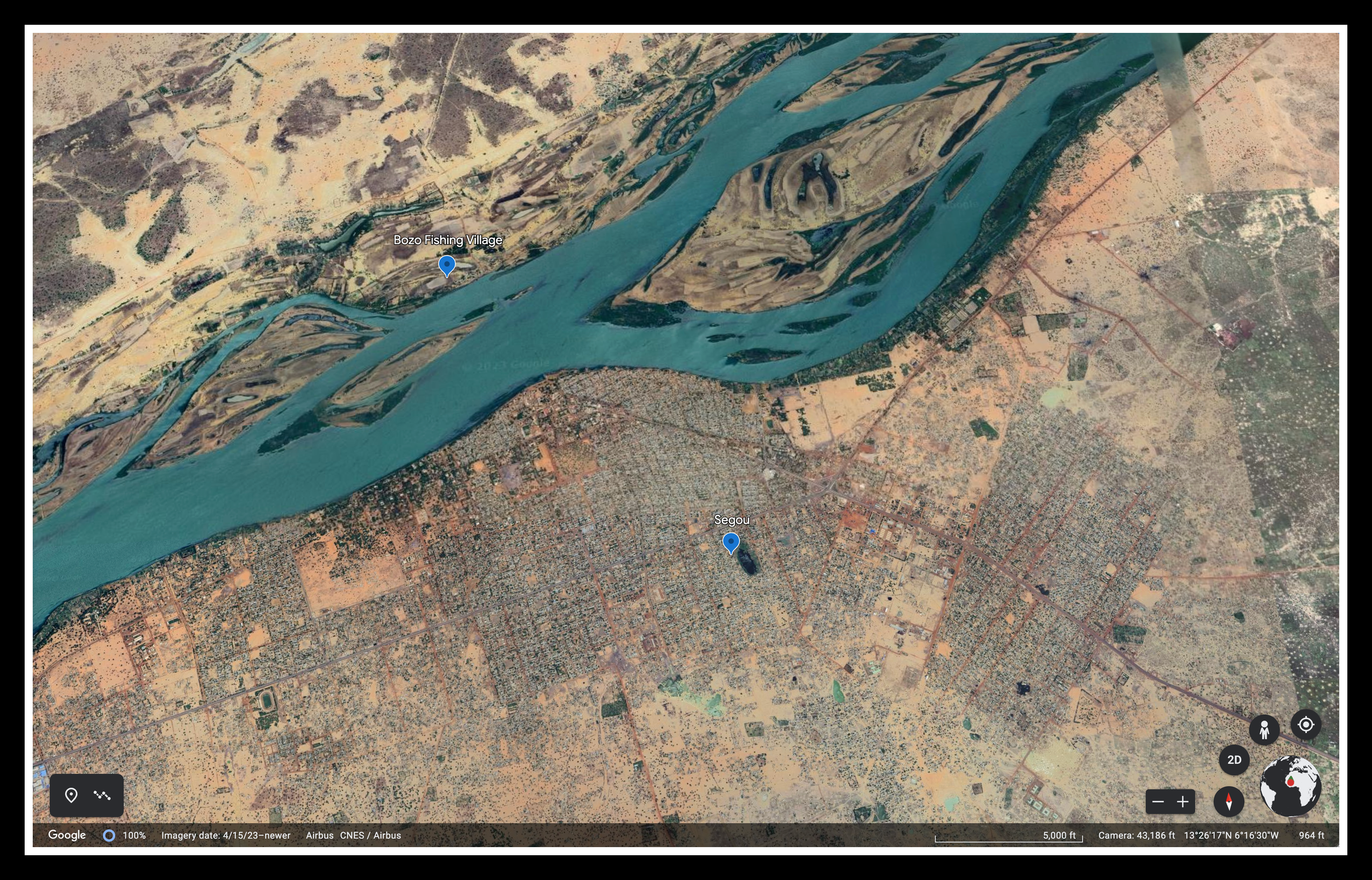192 - Segou, Say Me; Say It Together... Naturally (Segou, Mali)
ON TO SEGOU, a riverside town 230 km east of Bamako on the Niger River. Another stifling bus ride. Another overpriced hotel. Thankfully, the town does indeed have a touch of the “languid riverside charm” I'd read about. We patrolled the riverbank in the evening and made initial inquiries about a day trip downriver. A variety of ethnic groups inhabit the region, including the Fulani, Bambara, and Bozo tribes, to name a few.
Our plan was to visit Kalabougou, a Bambara village famous for pottery, followed by a Bozo fishing village. The price for a half-day pinnace trip started somewhere between “absurd” and “you must be high.” I blame rich French tourists who don’t give a merde about costs. We'd had a long day and were in no mood to negotiate, too pooped to pop, as the saying goes. Come the morrow, we’d drive a hard bargain, goddamnit.
We enjoyed a decent dinner and befriended a small local boy whose curiosity we piqued. After a few attempts at surmounting the language barrier, he asked for money. I never feel right handing out cash, so I offered to buy food. This sometimes helps separate the truly needy from those just screwing around. I purchased fried snacks along the road and watched as the boy's face lit up. He appreciated the shit out of it. I was ashamed for testing him, but couldn’t help think it’s an unavoidable byproduct of travel in poorer areas… or I’m an asshole. That level of poverty is hard to face head on. I suppose it’s better to feel something rather than to close it off completely.
Caution: Flat-footed alien children milling about.
It costs 10,000 Frs to piss on this wall.
After breakfast the next morning, we headed back into town to finagle a river expedition. It turned into a mini-clusterfuck. Our crime? Attempting to negotiate with more than one person. How dare you?! Leslie went inside one establishment to hash out a deal while I stood outside and watched a group of men yell at each other in the local dialect over the right to command our voyage. That wasn't awkward at all. Just wanted to explore the river, not instigate a battle royal. In the end, we made an agreement with a gentleman we'd spoken with the previous evening. He neither acknowledged the fact that we’d already met, nor that his price was half of what it was the day before. Huh.
Although it got off to a rocky start (a faulty engine forced us to switch boats), overall it was a most enjoyable day. On the way to Kalabougou, we encountered some shepherds crossing the river with their cattle in preparation for Dewgal (“The Crossing”) when Fulani herders drive their herds south from the edge of the Sahara to greener pastures, culminating in a festival at the riverside village of Diafarabe.
Kalabougou: Come for the pottery. Stay for the lifestyle vignette. As I walked among the small mud huts, I began to think I was walking through a three-dimensional illustration of the phrase “dirt poor.” Sure, it was interesting to listen to a semi-comprehensible explanation of the pottery construction process in French (I don't parle), but the real draw was seeing how these folks live. It’s unsettling to walk around such places with a camera worth more than people's homes. Want to appreciate your life? Stop by Kalabougou.
On the way back to Segou, we spent time at a couple of Bozo fishing villages. And no, these are not carnival enclaves filled with fishing clowns (although the temptation to utter things like “Hey, look at those Bozos” or “What's that Bozo doing” was overwhelming). The first was a market village where folks gather once a week to sell their catch across the river in Segou. The second was an actual fishing village where we saw nets being hand-made and piles of fish traps ready to be deployed along the coast. Our guide showed us his modest home and introduced us to a nearby family that graciously offered us tea.
While strolling through the village, we soon attracted an entourage of small children, some of which clasped our hands and shadowed us for the duration. Their adorable nature was matched only by that brand of pathos evoked by encountering young children living in a state of quiet desperation. I doubt I could ever grow accustomed.
At one point, an elderly women attempted to sell what appeared to be some type of family/tribal heirloom. I think it was a small stand for burning incense but I couldn’t be sure. I politely declined, feeling awkward about the offer. I guess cash trumps tradition.
The next morning, we went to the bus station to await a bus to the famed village of Djenne. Emphasis on “wait.” The bus was coming from the capital (Bamako) and, theoretically, headed toward Mopti. The idea was to instruct the driver to drop us off at a T-junction where we would catch another ride 30 kilometers to Djenne. When the bus pulled up two hours late, it was packed, stifling hot, and smelled like the ass of a donkey. Everyone on board seemed to be enduring a form of mild torture. We met a fellow traveller with sweat pouring off his brow. Let's just say it was less than inviting. There were two seats (separate), but it would’ve required a sardine impression. Normally, we'd just suck it up and drive on. Not this time. Yes, we wimped out, but sometimes you have to go with your instincts. Ours were telling us to get the fuck off the bus. We obeyed.
Back into town to review our options. We could wait another day for the same bus we'd just opted out of, or we could attempt to negotiate a taxi all the way to Djenne. Contestant #1 offered to have his driver/friend take us in his “very nice” car for the bargain basement price of 80,000 CFA (roughly $160 US at the time). Ahhh… no. The ride was no more than 80 km, so we decided this was ludicrous. Ludicrous, I say!
After lunch, Leslie was on a mission to find other contestants. I continued my negotiations with #1. Not only did he want to provide transport to Djenne, he also offered to organize a trip to Dogon Country, a place we had every intention of visiting. I figured I’d listen to his spiel, as this might make him amenable to a discount on the taxi to Djenne. While he was laying out a possible itinerary, he received a phone call and politely excused himself. In the meantime, I listened while street vendors attempted to sell me CDs, small Hallmark card-like paintings, and Kola nuts (apparently a necessary acquisition for anyone wanting to take pictures of the Dogon people).
Leslie found a gentleman she met the previous day in the midst of our river extravaganza negotiations and inquired as to transport to Djenne. He called his friend… who just happened to be the guy I was discussing Dogon with and who had already offered the insane-o price of 80,000 CFA. When my guy returned to find it was Leslie who was inquiring, he was slightly miffed. Why? Because we had the brass ballsacks to negotiate with others. How dare you?!
He dropped to 70,000 CFA but not before laying a guilt trip on Leslie by pointing out how they were “both young and need to stick together.” It’s not my fault Leslie had no sense of solidarity. Talk about moral bankruptcy. I'd like to believe we weren’t callous, unfeeling robots with little regard for the plight of others, especially in one of the poorest nations on earth. We don't mind paying a bit more than the “local” price, but a rate based on our country of origin and our ability to pay has a tendency to chap my ass. Leslie then proceeded to chap his by declining.
After a fair amount of wrangling and a minor investigation into alternatives, we (as in Leslie) managed to whittle the price down to 50,000 CFA. I’m sure even that was inflated, but no one was willing to go lower. Of course, it did require Leslie to hear yet another Dogon Country sales pitch. Problem was, even if we wanted to go with some of these folks, we had no idea as to when exactly we’d be going. Not only that, none of our salesmen were from Dogon, a requirement we'd been instructed to insist upon.
“Ready to switch things up, we boarded a bus for Segou, four hours north. Of course it didn’t take four hours, though; that would just be silly. With waiting and multiple stops it took somewhere in the neighborhood of six to seven hours, give or take. It was more of the same hot, sweaty, sticky mess. At least this time we had plenty of water, a few snacks to hold us over, and seats next to the ceiling vent.
We ended up spending three nights in that sleepy town where the Niger and Bani River meet. It was there that we realized just how deeply Mali’s hands would seep into our pockets. Inquire about a motorbike rental and most will quote you 30,000 CFA for the day, which is almost $60; madness I tell you. Want to hire a boat and visit the fishing village across the way? That will be 22,000 CFA. Nevermind the fact that it’s just a hop, skip, and a jump away, using almost no petrol! How about that pottery village everyone keeps talking about? Oh, that will be 27,500 CFA, plus an additional 3,000 CFA per person for their chief – Ca-ca-ca-crazy.
We both realize that as foreigners we’re expected to pay more, which is fine, but it needs to be within reason. After trial and error, we came to the conclusion that most figures should be divided by five; in some cases four, but typically it’s five. I’m not sure why this is, but it works. Want to buy a pair of shoes? Divide by five. Need a taxi ride? Yep, divide that by five. Have your eye on a painting or crafty little item? Better divide that by five, too. Now, I should probably mention that it doesn’t mean you’ll actually get it for that price, because in some cases you won’t. I’m just saying that it’s probably the fair price and a good place to start your bargaining.
After splitting up and shopping around, we managed to find a guide, secure a private pinasse, and head up the Niger River to a nearby Bambara pottery village (Kalabougou) and fishing village (Kala Daka), all for a reasonable price. Even though we decided against hiring a motorbike, I met someone who was willing to lend his out for 6,500 CFA, instead of 30,000.. Asking around, as well as persistence, pays off in the long-run.
The villages were interesting, although I wouldn’t say the pottery or fishing is what makes them so. Meeting the friendly people, playing with the children, sharing a cup of tea, and seeing how they live, is the real draw. We had a lovely day, and looking back, it was definitely one of the most memorable experiences I had while in Mali.”
Leslie Peralta, “Our Time In Segou…” — Notes From My Travels
“By day three we were ready to forge on. We had a scrumdiddilyumptious breakfast at a little restaurant we found the previous night. The food was the best we’d had in a long time, and the service impeccable. To top it off, they served bissap, a popular African drink made from hibiscus flowers, frozen. It’s oh so awesome, and oh so good.
With our bellies full, we purchased our tickets for D’Jenne and waited at the bus station. Hours passed, but the bus was nowhere to be found. We had starring contests, took turns with my Kindle, paced back and forth, and watched the clock go tick-tock, ever so slowly.
It was mid-afternoon by the time our number rolled on the lot. Unfortunately, the bus had come from Bamako and was already full. The seats, aisle, cargo area, and roof, all filled to the brim. When I inquired about our seats, a man boarded the bus, moved some things around and found two tiny crevasses to squeeze us into.
I couldn’t do it; no way, no how. I looked at the back of the bus and felt my anxiety level rise, as I tried to catch my breath. The bus rides are bad enough on their own, but the thought of enduring it without adequate seating, separated – me surrounded by several large men, drowning in a pool of their sweat, after spending hours waiting in the blistering sun, was just too much to handle. Rich agreed.
If you know me well, then you know that I have a high tolerance for just about everything, but this is a recently discovered weakness of mine. I would far rather empty out my bank account by hiring a taxi than get back on that bus.
I left Rich with our belongings while I scoured the streets, looking for a place to stay and a reasonable rate to D’Jenne. Most people I talked to wanted somewhere between 70,000-85,000 CFA for the journey, which is ludicrous. After several failed negotiations, I ran into Abraham, the nice young man who offered me a fair rate on his motorbike. I explained my dilemma and he took me to meet his brother, Van, who has a car and driver. He agreed to give me a significantly lower rate, but it was still more than I wanted to pay.
After humming and hawing, we made the deal and decided on 8am the next morning. I would later learn that while the rate I received was probably the lowest I’d find, it was still far too much. It’s just the way of the world, or at least Mali.
Later that night, Abraham and Van stopped by the hotel to pitch their services for Dogon. I listened to their presentation, but still wasn’t ready to pull the trigger. Little did we know, this was just the beginning; guides would soon be hounding us left and right, and with so many options, it’s hard to choose.”
Leslie Peralta, “I Just Want To Go To D’Jenne” — Soledad: Notes From My Travels














































